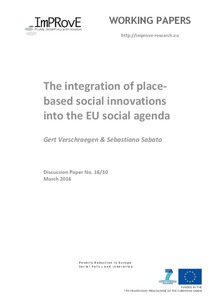The integration of place-based social innovations into the EU social agenda

ImPRovE, Antwerp ; Verschraegen, Gert ; Sabato, Sebastiano
ImPRovE - Antwerp
2016
22 p.
EU policy ; innovation ; poverty ; social exclusion ; social policy
Working papers
16/10
Social policy
English
Bibliogr.
"This report examines how place-based socially innovative policies and actions can be better integrated into the broader European Union (EU) social agenda. On the basis of previous work and a roundtable taking place in the context of the Improve project, it a) identifies some main challenges for upscaling and consolidating place-based social innovation throughout the European multi-level governance system; b) analyses whether social innovation dovetails with the broader European policy goals of territorial cohesion and public participation, and c) proposes some cautious policy recommendations with regard to how EU resources can be used to better support socially innovative practices. Three main conclusions can be drawn from our analysis. Firstly, the EU supports social innovation both directly (by providing different kinds of resources for local socially innovative projects, not limited to financial resources) and indirectly, by supporting European umbrella organisations operating in the field of poverty and social inclusion. Yet, the degree of innovativeness of EU supported projects differs. Secondly, although EU support for place-based social innovation is significant, it is not consistent throughout the whole life cycle of social innovation. EU support is particularly effective in the early stages of socially innovative projects (conception and start-up). Institutionalisation of those projects depends on domestic circumstances (including welfare regimes' peculiarities) and, what is more surprising given the emphasis at the EU level, EU resources are no used for up-scaling local socially innovative practices. Thirdly, an important challenge is to adapt the increasingly top-down approach in the support of socially innovative projects, with scarce attention being paid to the involvement and empowerment of socially excluded groups."
Digital
The ETUI is co-funded by the European Union. Views and opinions expressed are however those of the author(s) only and do not necessarily reflect those of the European Union or the ETUI.